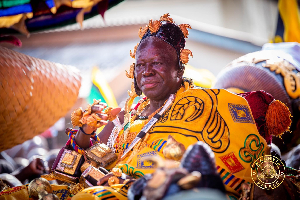As the workforce in the cocoa sub-subsector ages, being at an average age of 55-years, the critical concern has been how to transform cocoa farming and make it more appealing and attractive for the youth to take over.
However, despite government’s own efforts to lead the charge, one of the programmes that is nurturing the next generation of cocoa farmers is the MASO youth in cocoa programme.
The programme is empowering the youth and making them realise there is a future in the cocoa sub-sector, and is being implemented by a consortium of partners led by Solidaridad.
Introduced in 2016, it has so far trained about 4,300 young men and women in its first two cohorts, while 2,000 more youth are now also undergoing the third cohort.
The five-year programme is focused on creating employment opportunities for the youth in Ghana’s cocoa communities.
For instance, 26-year old Enoch Gyebi from Sefwi Asawinso in the Asawinso district of the Western Region – a junior high school graduate – like many rural youths unable to seek higher education due to lack of support, worked as a carpenter two years ago.
Gyebi said the thought of becoming a farmer as a youth, despite living in an area very notable for its agricultural produce, had never crossed his mind until a friend told him about the MASO programme.
Currently, Gyebi – who could barely make ends meet – now owns a five-acre plot of land out of which he has used 3 acres to plant cocoa and hopes to become a celebrated ‘professional cocoa farmer’ someday, employing a lot of youth as farmhands also.
Similarly, Mawuse Hotor – a 26-year old senior high school (SHS) graduate from Akome Gbota in the Ho West district of the Volta Region, has found that unlike her parents – who went into farming not too long ago – she can become a professional cocoa farmer.
Having been into cocoa-farming for two years, Mawuse now owns a two and half-acre plot of cocoa farm, and says the MASO programme has opened a brighter opportunity for her to succeed as a young woman from a deprived rural area.
Adu Prince Konadu, who is now 24-years old and a SHS graduate, was a pupil-teacher from Asawinso Achiachen, also in the Asawinso district of the Western Region.
Konadu, unlike his peers, has been a caretaker cocoa farmer and had dreamt of an opportunity to own his own cocoa farm in spite of the reluctance of many other youths to go into cocoa.
He says he has always been motivated knowing how lucrative cocoa farming is, having learned many things from his parents who are cocoa farmers themselves.
But also like the others, his dream has now materialised and through the MASO programme and he now boasts a two and half-acre plot of cocoa farm, having started some two months ago.
These are just about a few untold stories about some current beneficiaries of the programme, which is being implemented in the Western, Ashanti, Brong Ahafo, Volta and Central Regions.
The Country Director Representative-Solidaridad Ghana, Suzan-Hermina Yemidi said: “If efforts are not intensified to encourage the youth to have an interest and take up cocoa farming, the future of cocoa production will be in jeopardy.”
She added that one of the key consequences of this will be a reduction in foreign exchange earnings.
Ms. Yemidi, at the maiden edition of the MASO youth in cocoa conference in Kumasi, observed that there is a unique opportunity in the sector for youth economic empowerment – thereby contributing to a reduction in youth unemployment.
“Solidaridad aims to be part of the solution by equipping the youth with skills required to enable them successfully operate as confident and informed entrepreneurs within the cocoa value chain.”
Among others, she said, the conference was aimed at eliciting government and donor support for youth in cocoa as a contribution toward long-term sustainability of the sector.
The Executive Director of Cocoa Health and Extension Division (CHED) of the COCOBOD, Mr. Emmanuel Opoku, acknowledged that cultivating entrepreneurship among the youth has been key to the current government.
He said the issue of aging cocoa farmers is a threat to sustainability of cocoa production and job security for many people who depend on a sustainable cocoa value chain.
To help address this development, he said, COCOBOD is implementing some productivity-enhancing initiatives.
These has the objective of raising farm productivity from the current average of 450 kilogrammes per hectare to 1,500 kilogrammes per hectare.
“Our focus is to solve the low productivity puzzle and lay a firm foundation that will stimulate the youth’s interest and make cocoa production a target business venture.”
Business News of Tuesday, 25 September 2018
Source: thebftonline.com

















